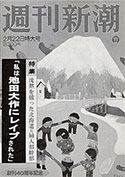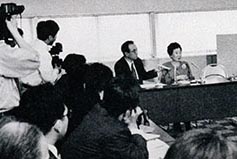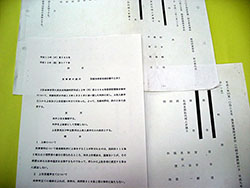|
[Documentation]
POLITICAL CONTEXT

With a political motive, special reprints of Shukan Shincho article were distributed to voters
In February 1996 the tabloid magazine Shukan Shincho printed a story in which Mrs. Nobuko Nobuhira made allegations of rape against Soka Gakkai's honorary president, Daisaku Ikeda. The accusations were made at a time of great political upheaval in Japan--the Liberal Democratic Party (LDP), which had ruled Japan for 40 years, had been defeated in Upper House elections for the first time by a coalition that happened to be supported by Soka Gakkai, and the LDP had vowed never to lose power again. Mrs. Nobuhira's allegations were used in massive anti-Soka Gakkai smear campaigns mounted by the party.
The LDP quickly distributed millions of reprints of the article throughout Japan, and cited the allegations by Mrs. Nobuhira in several issues of its bulletin, Jiyu Shimpo. The LDP also discussed this issue during three Diet sessions, and attempted to summon Mr. Ikeda to appear in the Diet.
SHIFTING TESTIMONY
On June 5, 1996, Nobuko Nobuhira and her husband Junko Nobuhira brought the allegations of rape against Mr. Ikeda in a civil suit. Shortly thereafter, Mrs. Nobuhira held a conference at the Foreign Correspondents' Club of Japan to further publicize their allegtions. During the ensuing court trials, however, they repeatedly changed their factual allegations in the face of counterevidence contradicting their assertions and Mrs. Nobuhira's original published allegations.
CASE DISMISSED

Mrs. Nobuko Nobuhira's press conference, where tabloid journalist Masao Okkotsu (seated to Mrs. Nobuhira's right, speaking into microphone) serves as MC
The Tokyo District Court dismissed the allegations in May 2000 as "an abuse of the right of action." The judge found "no factual evidence" to support their allegations and stated that their lawsuit was "entirely against the principle of good faith." [See Unofficial Summary and Translation of the Court Judgment in the Nobuhira Claim for Damages.] In June 2001, the Supreme Court of Japan upheld the lower courts' decision and rejected the plaintiff's appeal.
GRUDGE
Mr. and Mrs. Nobuhira are ex-members of Soka Gakkai who were dismissed from their leadership positions in the organization in 1992 for borrowing large amounts of money from elderly members and failing to pay it back. In 1993 they quit Soka Gakkai. In 1995 they began making repeated phone calls to Soka Gakkai headquarters threatening revenge.
"ABUSE OF THE RIGHT OF ACTION"
The District Court judge explained the legal rationale for determining the Nobuhiras' claim as "an abuse of the right of action" as follows:

Shukan Shincho, a weekly tabloid, rehashed stories about the Nobuhiras' claim over 20 times
- This lawsuit is not a sincere attempt to realize the plaintiff's substantive right or to resolve a conflict, but an attempt to impose disadvantages, such as the burden of defending this suit, in court and out of court, on the defendant;
- The right claimed by the plaintiff lacks factual basis and there is therefore very little necessity to protect this right; and
- From this, we can not avoid finding that the present suit, in light of the objective and purpose of the civil procedural system as a whole, is extremely unreasonable and entirely against the principle of good faith.
AN "UNJUST SCHEME"

The Supreme Court of Japan upheld the lower courts' decisions and concluded that the Nobuhiras' claim was "an abuse of the right of action"
Based on this rationale, the judge concluded that the "plaintiff's claim in this case can be considered unlawful, because it abuses the right of action. Continuing the proceedings for this case is not only cruel to the defendant, but may result in the Court contrarily assisting the plaintiff in pursuing his unjust scheme. Thus, terminating the hearing of this lawsuit at this time is reasonable."
Furthermore, the judge criticized the weekly Shukan Shincho for printing Mrs. Nobuhira's assertion, stating: "there is no reason why the defendant should have to suffer pointless media coverage of an extremely baseless, scandalous accusation such as this."
Later in April 1998, after receiving a letter of protest from Soka Gakkai, the LDP party newspaper apologized, stating, "we must acknowledge the inappropriateness of having in effect cooperated in the spreading of falsehoods. For this we apologize and express our profound regret."
[Note: May 20, 2004 exchange rate used throughout. Amounts have been rounded for ease of comprehension.]
[1] Judgment of the 28th Civil Department, Tokyo District Court, in Case No. 1996-wa-10485 Claim for Damages; Junko Nobuhira vs. Daisaku Ikeda; Decision delivered at 10:00 a.m. May 30, 2000
[RETURN TO TEXT]
DOCUMENTATION |

